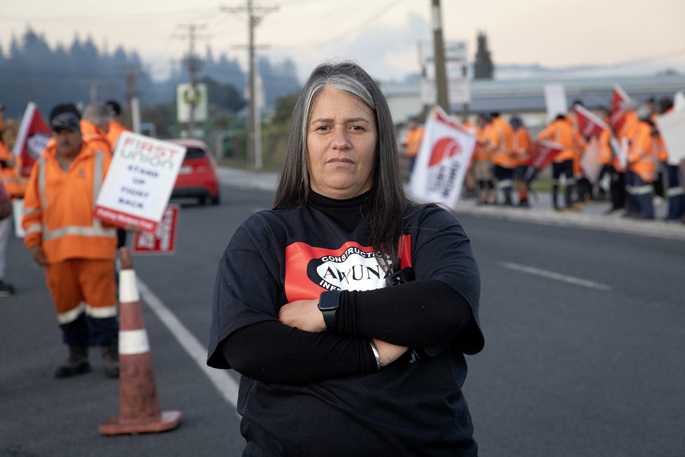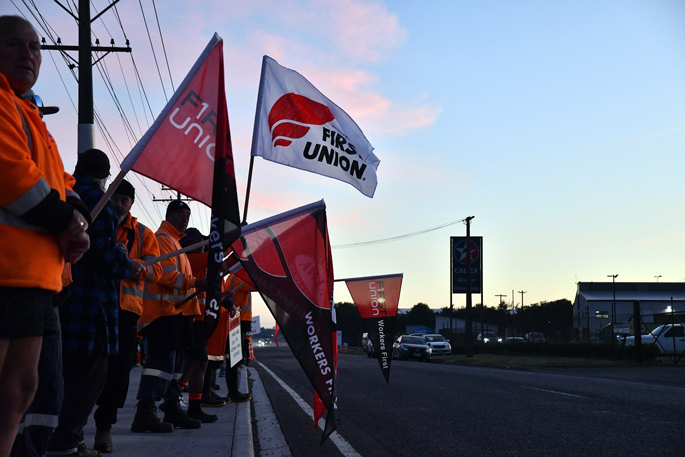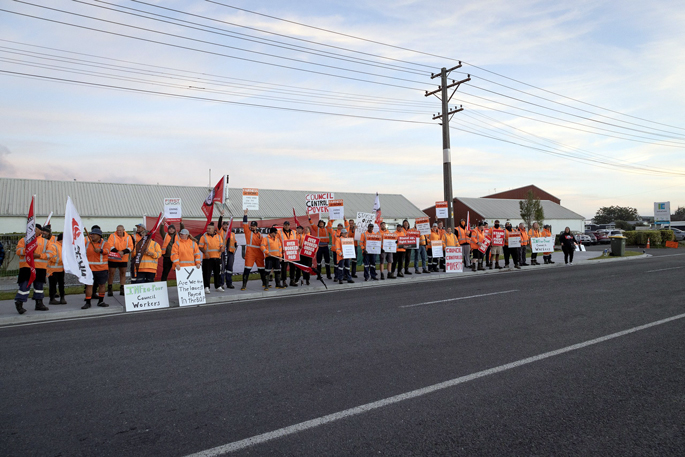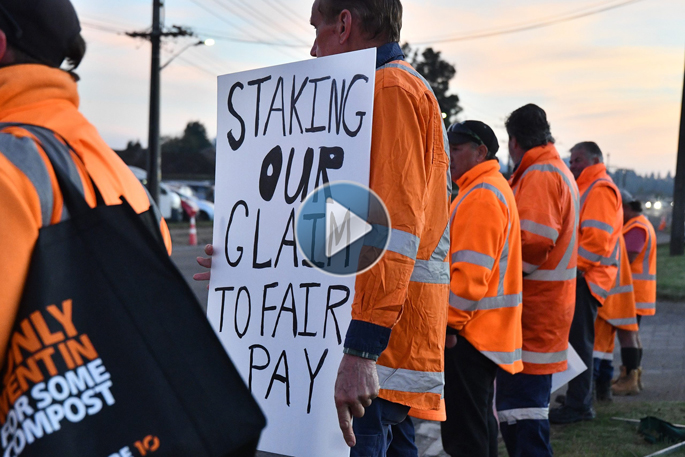Seventy-five workers at Rotorua’s council-controlled organisation InfraCore who would normally be tending to the city’s garden beds and graves were instead waving signs as they began their protest, calling for a living wage.
On the first of the eight total planned days of strike action, signs held by some of the workers read: “Council-controlled poverty” and “overworked and underpaid”.
It followed eight months of failed negotiations between the workers’ unions and its employer. While InfraCore offered a 5 per cent increase to workers, their unions said that was not enough to close the gap between other similar Bay of Plenty organisations.
Amalgamated Workers Union represent 59 of the striking InfracCore workers. Bay of Plenty organiser Toni Smith spoke to Local Democracy Reporting (LDR) as she said workers were contractually blocked from speaking to the media.
This was later clarified by InfraCore’s interim chief executive Regan Fraser who said that there was no blanket clause but a line in its employee handbook stating that workers could not make derogatory and/or inflammatory comments about InfraCore, employees, clients or suppliers via social media networking sites or any form of print or broadcast media.
 Amalgamated Workers Union New Zealand Bay of Plenty organiser Toni Smith. Photo / Andrew Warner.
Amalgamated Workers Union New Zealand Bay of Plenty organiser Toni Smith. Photo / Andrew Warner.
Smith said the gap between InfraCore and other council-controlled organisations was 9.93 per cent. She said all others were paid the living wage - $26 an hour - which was why it viewed the offered increase as insufficient.
She previously said there were staff members with 10 years’ plus experience on $23.65 an hour.
The minimum wage is set to increase from $22.70 to $23.15 per hour in April.
Smith said the workers were passionate about their mahi.
“Every council has the same problems, the same issues, but all of these councils [CCOs] are paying $26 . . . toilet cleaners, cleaners, everything.”
The workers were in the parks, cemeteries and the provision of water services departments.
Smith previously said workers contacted community groups to minimise disruption to the public. She said they would work with InfraCore management to ensure the strike would impact daily maintenance services but not affect burials and critical services such as water services.
First Union represented 16 workers. Organiser Phil Graham said the workers were struggling.
“If they don’t get to the current living wage . . . as we all know, the cost of living is escalating.
“It’s going to create more poverty and hardship on families which naturally creates problems at home.”
He said it could be “easily resolved” by a living wage.
InfraCore’s Fraser said the unions’ current ask was for a minimum of $26 per hour as well as pay parity for all rates above this.
“InfraCore does not have the ability to meet this.
“Based off their comments it seems that their main concern has now changed to just the lowest rate lifting to $26 per hour. We will engage with the unions again to explore what this could look like.”
 Infracore workers on the first day of strike action. Photo / Andrew Warner.
Infracore workers on the first day of strike action. Photo / Andrew Warner.
Fraser previously told LDR the organisation was under financial pressure and more than the 5 per cent it had “stretched resources” to offer would be unsustainable.
For the year ending in June, the council would give $13,279,000 to Infracore budget. Its total revenue was projected at $15,466,00, but after expenses estimated a before-tax loss of $39,000.
Staff costs made up $9,266,000 of the total $15,198,000 expenses.
The Service Level Agreement the council had with InfraCore was funded by rates and corporate services general manager Thomas Colle said it comprised of:
- A fixed amount to cover things like mowing, gardens, inspection of assets and drains etc, and to operate drinking water pumping and treatment plants;
- Payments made on an as-needed basis for responding to reactive work like fixing water leaks, fixing playgrounds and other assets, operating the crematorium and looking after cemeteries.
He said it was working with InfraCore to identify and reduce financial risks and the new agreement would take a longer-term view for the services the CCO provided to the council.
Mayor Tania Tapsell previously said funding increases would fall to the community, which needed to be considered. She said it was not always possible the council could fill shortfalls.
 Seventy-five InfraCore workers went on strike on Friday in a bid for better pay. Photo / Laura Smith.
Seventy-five InfraCore workers went on strike on Friday in a bid for better pay. Photo / Laura Smith.
She said it was expected that council-controlled organisations independently manage, bid for contracts and deliver services in a sustainable way.
The council’s infrastructure and environment general manager Stavros Michael said, at midday on Friday, there had been no major impacts resulting from the action.
Michael said it was monitoring the situation and would reassess as required and any major anticipated impacts would be communicated appropriately.
Workers voted to strike from 5am on Friday to 5am on Tuesday unless directed into mediation beforehand. A further four strike days were planned, the last ending on April 3 at 5am.
LDR is local body journalism co-funded by RNZ and NZ On Air.




1 comment
Unsupportable
Posted on 25-03-2024 18:33 | By Let's get real
Why do councils believe that they must lead the way in wage levels and payments to outside contractors.
Are our seat warmers in council offices reading party policy and enabling it by stealth...?
Overseas they elect councils on party political issues and yet we know nothing of the beliefs of our council offices.
There's absolutely NO honesty in decision making, and, if it were possible, even less accountability.
Leave a Comment
You must be logged in to make a comment.